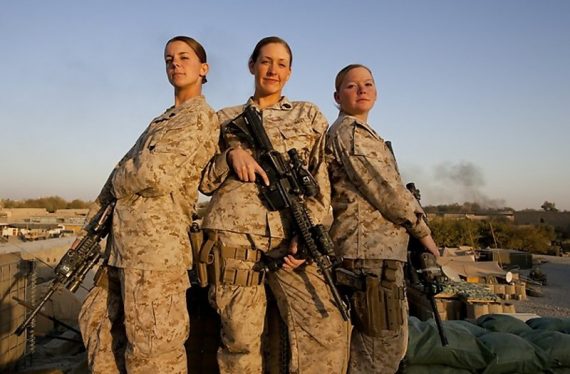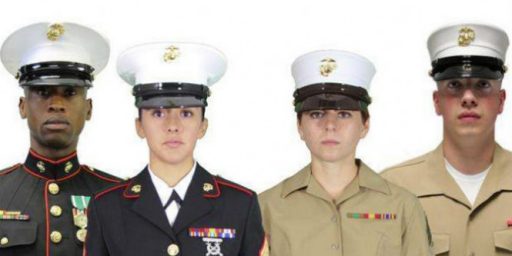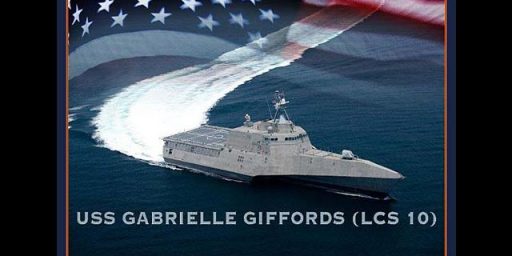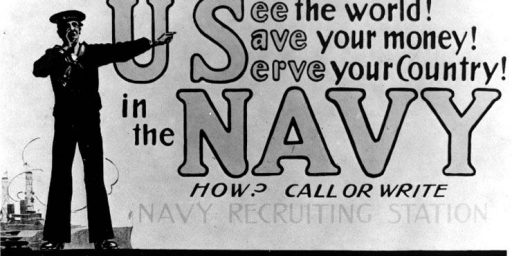Navy Secretary Doubling Maternity Leave to 12 Weeks, Lowering Weight Standards
Ray Mabus is trying to make serving in the Navy and Marine Corps more attractive to women.
Ray Mabus is trying to make serving in the Navy and Marine Corps more attractive to women.
Navy Times (“Navy to double maternity leave, make fitness changes“):
[Navy Secretary Ray] Mabus, in a speech to the U.S. Naval Academy in Maryland on Wednesday, will announce plans to ease body fat restrictions, boost career flexibility, and push to recruit more women in the Navy and Marine Corps, while opening up the last jobs that remain closed to them.
Some of the initiatives aimed at retaining women include doubling paid maternity leave to 12 weeks, longer child-care hours, an updated co-location policy for dual military couples and opportunities like the career intermission program, which allows sailors to take time off to pursue educational or other personal goals.
[…]
Mabus has dedicated a big part of his tenure as secretary to integrating women into the fleet, from opening once closed jobs to outfitting men and women in the same styles of uniforms.
He wants to take that a step further, the official said, by opening the last remaining closed billets and increasing recruiting of women to 25%, up from the current 18% for the Navy and about 5% for the Marines.
“When you look at the number of (female) graduates from high school, number of graduated from college, from (science, technology, engineering and math), they far surpass what we see in the Navy and Marine Corps,” the official said.
While the armed forces have generally been ahead of the curve on dealing with social issues, they’re woefully behind their major corporate counterparts in dealing with family issues. Irregular work hours, frequent reassignments, and the difficulty of navigating the career assignment system for dual-career couples make raising a family difficult. From the broad outlines sketched out here, it appears that Mabus is looking to solve some of these issues.
The maternity leave policy is interesting. On the one hand, the existing 6 weeks of paid leave is generous by American corporate standards if woeful by the standards of the rest of the civilized world. Doubling that to 12 weeks would be a very attractive retention tool for a woman considering offers in the private sector. On the other hand, there’s resentment by many of the current policy. The military has a mission-first culture and many see leaving one’s duties for 6 weeks—much less three months—as putting oneself above the mission. And there’s also the “special treatment” argument given that fathers don’t get the same benefit.
The other major proposal here presumably isn’t about recruiting and retaining women:
With an eye toward the Defense Department’s more lenient body fat standards than the Navy’s, officials are looking at increasing the body fat limits for being able to take the physical readiness test portion of the PFA.
That would mean that sailors who are over the Navy’s body fat limit would still be able to take their Physical Readiness Test, as long as they’re within Defense Department standards.
From there, the official said, medical professionals could address body fat issues non-punitively.
This is both long overdue and controversial. On the one hand, there’s little doubt that, as most military jobs, like most private sector jobs, are increasingly about one’s ability to think rather than perform physical tasks, the focus on weight standards is outmoded. To the extent that the concern is simply about health and the ability to perform the mission, shifting to a system that’s evaluative rather than punitive makes sense. We reject far too many talented recruits because they’re overweight, tattooed, or otherwise don’t meet appearance standards based in a bygone era. On the other hand, there’s a deep-seated bias in the military—which I confess to still harboring—against those who look chubby in their uniform. It’s completely irrational in most instances but is strongly rooted in the culture.






Why would you call it irrational? Certainly there’s a negative impact to overall military image should a civilian see a servicemember appearing out-of-shape in uniform.
It’s true that many times being a bit plump doesn’t affect an individual’s duty performance. Some of the finest and most dedicated of my fellow airmen have had difficulty staying within even the Air Force’s relatively lenient weight standards. Still, it’s important for the military to project an image of physical fitness and health, and not looking like Joe Bagadonuts in uniform is part of that.
I think changing the weight standards will help retain men as well, but it is a factor for women, especially those who have had children.
I got back to my pre-pregnancy weight fairly quickly after my first child, but after the next one the weight was a lot harder to lose. I’ve been told by other women that this is a common experience. It’s even more difficult for women whose jobs don’t allow them to breast feed (which I assume would be the case for women in the military).
Do they currently measure body fat, or use BMI? Its not the same thing, unless you believe half the NBA and two thirds of the NHL are overweight, and some of them even obese?
If they want to attract female recruits they might want to start by raping them less often.
I think my daughter would be a great potential recruit – not an academic kid, but strong, fit, physically brave, hard working and capable of aggression (junior blackbelt in Tae Kwon Do. But I would personally steer her away from that choice right now because young women in the US military are at far greater danger from their fellow soldiers/marines/sailors/airmen than they are from enemy forces.
Fix that problem and you’ll have plenty of female recruits.
Fathers also never get the “special treatment” of carrying around a small human for months and then squeezing it out their hoo-hoo. So boo-hoo!
@michael reynolds:
According to President Obama, several US Senators, and the presidents/administers of many US universities, a young woman is far more likely to be raped while attending classes on a college campus than while serving in the military.
So good thing your daughter isn’t academic.
And yet, young women flock to sign up to live in the rape dorms, hang out in the sexual assault library stacks and get blind drunk at the gang rape, uhm, fraternity parties?
The Navy might find it easier to meet “outmoded” physical fitness standards if they actually set down the Twinkies and ran PT once in a while. You’ll rarely see a chubby Marine. Think their regular PT might have something to do with that?
@JKB:
And you wonder why women and young people won’t vote for your party of inflamed anuses.
@Mikey:
I have a question for Mr. Mabus: How will his new policies help the Marines and Navy destroy the enemies of the United States?
@Fred Beloit: Well, you could make a decent argument that increasing the pool of potential recruits will lead to a higher-quality overall force because intelligent and trainable people currently excluded from consideration could be included. Bumping up maternity leave is pretty much a straight-up benefit increase, which makes service more attractive to both women and their spouses.
Just wanted to note that part of the headline here, “lowering weight standards,” is misleading. I initially read it — understandably enough — as suggesting that weight requirements for female troop members had been lowered, as though they must be at a lower weight now. Perhaps “relaxing weight standards” would be better. I’ll leave it as an exercise for the reader to decide whether rendering “relaxing standards” as “lowering standards” is problematic.
Audie Murphy, the most decorated American soldier in WW2, was 5’5″ and weighed 112 pounds. Waffen SS were required to be over 5’10”. The Japanese and Vietnamese were small people, but both seemed to fight pretty well.
I doubt one can find a positive correlation between physical size and fighting abilities. Fitness, training, discipline, motivation, initiative yes, but not size.